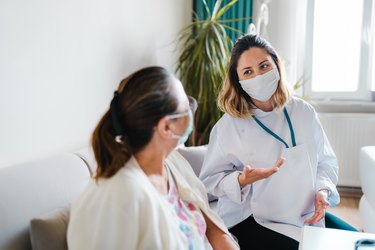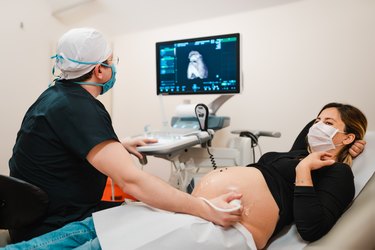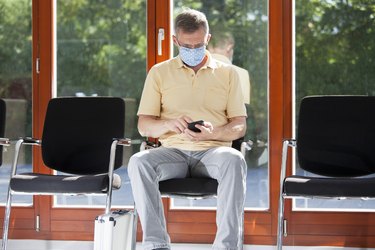
If you put off a medical appointment during the novel coronavirus pandemic, you aren't alone.
In a national survey, 41 percent of respondents reported skipping medical care from March to July 2020, according to a January 2021 report in JAMA Network Open. For many, this was in an effort to avoid contracting COVID-19.
Video of the Day
Video of the Day
But now that the doctor is back in and vaccines for COVID-19 are available, it's time to reschedule.
Get tips on how to stay healthy, safe and sane during the novel coronavirus pandemic.
If you're fully vaccinated, the guidance from the Centers for Disease Control and Prevention (CDC) states "you can resume activities that you did prior to the pandemic." That includes going to the doctor and dentist, and other health-related appointments.
Even if you're not vaccinated — or are midway through the process — seek emergency medical care right away if you're experiencing symptoms of a heart attack, have acute stomach pain or are undergoing certain cancer treatments, according to the CDC.
And some routine doctor's appointments shouldn't always be delayed if you haven't been vaccinated yet.
"It's important not to neglect regular health care visits," says Erin Michos, MD, the associate director of preventive cardiology at Johns Hopkins Medicine. "What we do with our health now will affect our health five or 10 years from now."
Here are seven medical appointments you shouldn't skip even if you're not fully vaccinated — and if you got your COVID-19 vaccine, but avoided these appointments during the vaccine, now is a great time to catch up.
Related Reading
1. Cancer Screenings
Cancer screenings, and even some cancer treatments, plummeted during the pandemic — a decline that could be responsible for 10,000 extra deaths from breast cancer and colorectal cancer over the next 10 years, according to data from the National Cancer Institute (NCI). Breast cancer and colorectal cancer account for about 1 in 6 deaths from cancer in the United States.
This estimate, says Ned Sharpless, MD, the director of the NCI, is "conservative." He adds, "we may see even more excess deaths than the model suggests if we continue to postpone screening, treatment and other cancer care."
Most cancers aren't diagnosed via routine (or asymptomatic) screenings, but rather, by examining people who are experiencing symptoms of certain cancers, he says. If patients postpone their evaluations, then their cancers may be more likely to go undiagnosed or appear later, at a more advanced stage, he explains.
"Not every medical test or treatment can be delayed, even in a pandemic."
If you are 55 or older, and have an average risk of breast cancer, you may be able to push back your next mammogram up to 24 months after their last one, according to the American Cancer Society (ACS). If you've had normal cervical cancer screening results in the past, getting screening at this time "is not urgent," per the ACS. That's because screening with a Pap test shouldn't be done more often than every three years, or, if an HPV test was used, every five years.
For colorectal cancer screenings, some people may be able to take an at-home test such as Cologuard, which can detect abnormal DNA in a stool sample that indicates the presence of colorectal cancer, Dr. Sharpless says.
Keep in mind, however, that these are just general guidelines. Talk to your doctor about whether you should be evaluated in person or whether you can schedule a telemedicine appointment with your doctor.
"The threat of COVID-19 is very real," Dr. Sharpless says. He acknowledges that people are right to be concerned about catching COVID-19. But, "not every medical test or treatment can be delayed, even in a pandemic," he says.
What About Oncology Appointments?
If you're undergoing treatment for cancer, your doctor can tell you whether you should continue with your regimen or whether you can delay any procedures or appointments.
You can also talk to your doctor about the timing of your vaccine. You should get vaccinated if you have an underlying medical condition, such as cancer, per the CDC. If you’re recently had — or are scheduled for — immunosuppressive treatment for your cancer, your doctor can help you figure out the best timing for your vaccination, according to the NCI.
2. Your Child’s Doctor’s Appointment
Even during the early days of the pandemic, the American Academy of Pediatrics (AAP) encouraged parents to keep their well-child visits whenever possible — especially for children under the age of 2, who need to receive vaccines, says Elizabeth Murray, DO, a spokesperson for the AAP and a pediatrician in Rochester, New York.
Childhood vaccinations in particular declined during the COVID-19 pandemic in some parts of the United States. In Texas, for instance, for 5-month-olds, there was a 47 percent decrease in immunization rates between 2019 and 2020, per June 2021 data analysis in Vaccine. The decrease was steeper, at 58 percent, for 16-month-olds.
Adults, Don't Fall Behind on Your Immunizations
Staying on track with vaccines isn't just important for babies and children; adults need to stay current on immunizations, too, according to the CDC. If you've put off a routine vaccination, like the flu shot, recombinant zoster vaccine (aka the shingles vaccine) or Tdap immunization (which prevents tetanus, diphtheria and pertussis), try to make it up as soon as possible.
Another reason why babies shouldn't miss their well-child visits is because pediatricians need to make sure that they're developing and growing properly. "If a newborn is not growing well, or perhaps their head size is growing very fast or large, that could be a sign of a problem," Dr. Murray says.
Pediatricians also need to check on the parents, to see how well the family is adjusting to the new baby and look for signs of postpartum depression, she says.
Well visits are best done in person, rather than via telemedicine. "You really need a good accurate weight and length and a measurement of the head size," Dr. Murray says. Plus, doctors want to listen to babies' hearts with a stethoscope for heart murmurs.
"For a newborn to go more than two months without any type of checkup, that could be potentially dangerous," Dr. Murray says.
Tip
Babies’ first well-child visit should be scheduled for the first week of life, per the AAP. Afterwards, babies should see their doctor at months 1, 2, 4, 6, 9 and 12. Between ages 1 and 2, babies should see their doctors at months 15, 18, 24 and 30. Starting at the age of 3, a child's well visits can be scheduled annually.
3. Prenatal Visits

Like other leading medical organizations, the American College of Obstetricians and Gynecologists (ACOG) encouraged doctors during the early stages of the pandemic to use telemedicine whenever possible.
But because people who are pregnant need to have tests like ultrasounds or blood work, they will also need to keep some of their in-person doctors' appointments, says Clara Ward, MD, a maternal-fetal medicine specialist with UT Physicians and UTHealth in Houston.
The number of prenatal care visits someone needs — and whether those appointments need to be in person — depends on their individual circumstances, Dr. Ward says. For example, some people (such as those with uncomplicated pregnancies) may have as few as 12 doctors' visits, whereas others will need extra monitoring.
Talk to your doctor about how many appointments you may need during your pregnancy, including how many must be in-person visits. Sometimes, doctors are able to group certain procedures — like vaccinations and blood glucose screenings — together, which can reduce the number of in-person appointments you may need.
Getting Vaccinated While Pregnant
Pregnancy makes a person more likely to get severely ill with COVID-19. People who are pregnant can get vaccinated.
More research needs to be done about the safety of the COVID-19 vaccine during pregnancy. That said, animal studies do not show harm, according to the CDC, and "what experts know so far is reassuring," notes ACOG.
4. Chronic Condition Check-Ins
If you have a chronic condition such as diabetes or heart disease, it's important to keep up with your routine medical care, Dr. Michos says. "Cardiovascular disease is still the leading cause of death [in the United States]," she says.
But maintenance doesn't all happen in person: Some people can measure their temperature, respiratory rate, blood pressure and heart rate at home, and keep up with their preventive care remotely, via a telemedicine appointment, she says.
For example, Dr. Michos asks her patients with heart failure to monitor their fluid intake by weighing themselves every day with a scale, and asks those with high blood pressure to monitor their numbers using a home blood pressure cuff. People with diabetes can monitor their blood sugar levels with daily blood glucose tests.
There are instances, however, when a doctor may want to schedule an in-person visit. "Sometimes when patients have heart failure, we need to examine them and listen to their lungs," Dr. Michos says.
Tip
If you have any questions about your condition — or think you may be sick — call your doctor, who can tell you where to go and what to do if you need treatment.
If you have asthma, continue to use an inhaler or other medications, and contact your doctor if you're experiencing any symptoms, per the American Academy of Asthma, Allergy and Immunology. You may be able to schedule a telemedicine appointment, but the organization notes that if you're having an asthma exacerbation, you may need to go to the emergency room or urgent care.
If you have an underlying medical condition, do not change your treatment plan without talking to your doctor first, according to the CDC.
5. Blood Tests

Even if you opted for a telemedicine appointment with your doctor, you may still need to get blood work done at a lab.
This may be the case for you if your doctor needs to determine if your medication is working properly. Taking too much of a certain drug could cause unintended side effects, whereas taking too little of it may not treat your condition, according to the U.S. National Library of Medicine.
"If people are on blood pressure or cholesterol medicines, we need to get labs to make sure their kidney function is normal and [know] how well their cholesterol is controlled," Dr. Michos says.
You can still do this safely even if you are not yet vaccinated. You'll need to wear a mask and stay 6 feet apart. Like doctors' offices, labs have also implemented precautions, Dr. Michos says. For instance, the number of people in the waiting room may be limited.
Related Reading
6. A Dentist Visit
There's a strong link between good oral health and good overall health, says Matthew Messina, DDS, a spokesperson for the American Dental Association.
Even a seemingly minor problem — like a lost filling or a chipped tooth — can quickly turn into a bigger issue. "If someone has a hole in their tooth, food and bacteria can get packed into the tooth and accelerate the rate of decay," he says.
Tooth decay, or cavities, can progress especially quickly if the inner layer of a person's tooth (the dentin) becomes exposed, Dr. Messina says. Left untreated, cavities can require a root canal or crown, or the tooth may even need to be extracted, per the Mayo Clinic.
"By the time it becomes painful," he says, "the [problem] is already a lot bigger than it needed to be."
In general, it's a good idea to visit your dentist once every six months for a routine checkup and cleaning, Dr. Messina says. But if you have a bump or other new growth in your mouth that doesn't heal within two weeks, ask your dentist to take a look at it. An injury — like a cut from, say, biting down on a nacho chip — should heal within that time, he explains; more serious growths, like oral cancer, won't.
"The good news is that dental offices are incredibly safe spaces to be seen," he says. Dentists have been wearing personal protective equipment (PPE) such as masks, gloves, glasses and gowns, as well as thoroughly cleaning their treatment rooms and medical equipment, since long before the COVID-19 pandemic.
If you're vaccinated or generally healthy (and not at a high risk for severe illness from COVID-19), visit the dentist for your routine cleaning. Your experience at the office may be a bit different than visits prior to the pandemic: For instance, there may be more protective equipment in place, the waiting room may be emptier and staff may call to ask about your health prior to your appointment, according to the American Dental Association.
If you're averse to scheduling an in-person appointment and have a question about your oral health, call your dentist. They might be able to use teledentistry (yes, telemedicine for dentistry exists) to look inside your mouth and examine any suspicious sores or cracks, Dr. Messina says.
7. A Trip to the ER
During the early stages of the pandemic, people avoided the emergency room because they were afraid of catching COVID-19 — so much so that ER visits dropped by 42 percent from the early spring of 2019 to the early spring of 2020, according to a report from the CDC.
But just because people aren't going to the emergency room doesn't mean that they aren't experiencing an emergency.
"People were ignoring heart attack and stroke symptoms, and unfortunately, we've been seeing some of the devastating consequences," Dr. Michos says.
"The safest place to be in an emergency is the emergency department."
While no one makes an appointment to go to the ER, it's important not to stay at home if you think you need urgent medical care. For example, delaying care for a heart attack could cause serious long-term complications, including aneurisms, heart valve problems or holes in the heart, Dr. Michos says. Delaying care for a stroke could cause permanent brain damage.
"The sooner we can restore blood flow [to the heart and brain], the better," Dr. Michos says.
This drop in ER visits led the American Heart Association (AHA) to launch the "Don't Die of Doubt" campaign, urging people to visit the emergency room if they're experiencing symptoms of a heart attack (such as chest discomfort and shortness of breath) or stroke (such as facial numbness or arm weakness).
The AHA points out that hospitals are taking precautions to limit the spread of COVID-19: Many have separate rooms for people who have the virus and who are suspected of having the virus, and staff members wear PPE and wash their hands regularly.
"The safest place to be in an emergency is the emergency department," Dr. Michos says.
Concerned About COVID-19?
Read more stories to help you navigate the novel coronavirus pandemic:
- JAMA Network Open: "Reports of Forgone Medical Care Among US Adults During the Initial Phase of the COVID-19 Pandemic"
- Centers for Disease Control and Prevention: "Framework for Healthcare Systems Providing Non-COVID-19 Clinical Care During the COVID-19 Pandemic"
- American Cancer Society: "Cancer Screening During the COVID-19 Pandemic"
- Vaccine: "Childhood immunization during the COVID-19 pandemic in Texas"
- CDC: "COVID-19 and Routine Vaccination"
- AAP: "AAP Schedule of Well-Child Care Visits"
- American College of Obstetricians and Gynecologists: "COVID-19 FAQs for Obstetrician-Gynecologists, Obstetrics"
- American Academy of Asthma, Allergy and Immunology: "COVID-19 and Asthma: What Patients Need to Know"
- CDC: "People with Certain Medical Conditions"
- U.S. National Library of Medicine: "Therapeutic drug levels"
- Mayo Clinic: "Cavities/tooth decay"
- CDC: "Impact of the COVID-19 Pandemic on Emergency Department Visits — United States, January 1, 2019–May 30, 2020"
- American Heart Association: "Don't Die of Doubt"
- AHA: "5 reasons hospitals are safe for heart, stroke emergencies — even in the pandemic"
- World Health Organization: "Considerations for the provision of essential oral health services in the context of COVID-19"
- CDC: "COVID-19 Vaccines for People with Underlying Medical Conditions"
- NCI: "Coronavirus: What People with Cancer Should Know"
- CDC: "COVID-19 Vaccines While Pregnant or Breastfeeding"
- ACOG: "Coronavirus (COVID-19), Pregnancy, and Breastfeeding: A Message for Patients"
- American Dental Association: "https://www.mouthhealthy.org/en/dental-care-concerns/covid-19-what-to-expect-when-your-dentists-office-reopens"
Is this an emergency? If you are experiencing serious medical symptoms, please see the National Library of Medicine’s list of signs you need emergency medical attention or call 911.